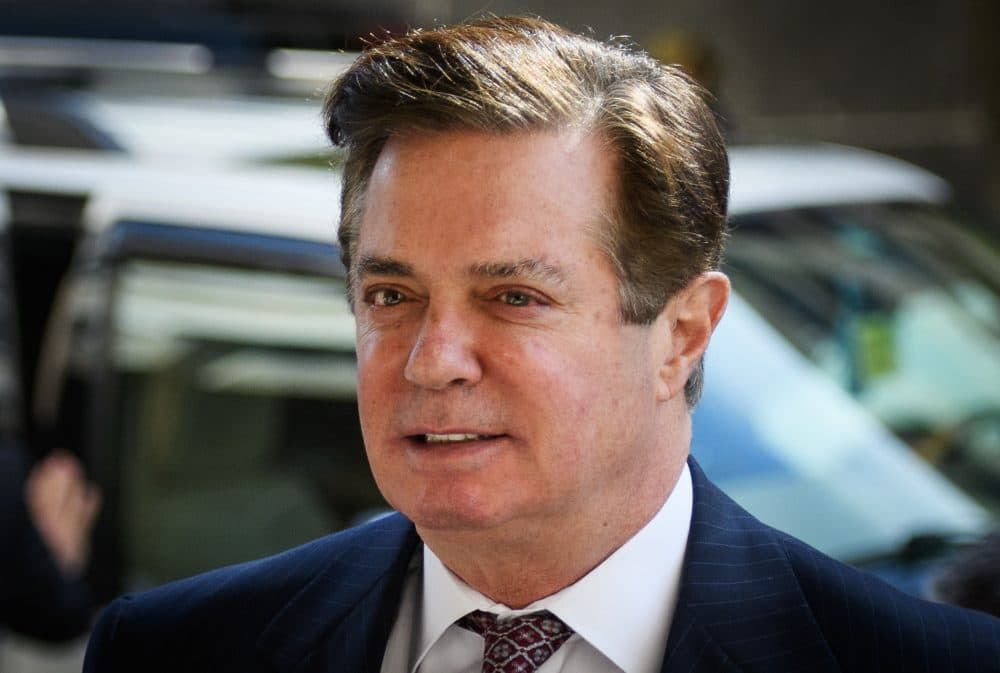Advertisement
What Are The Legal Implications Of A Possible Manafort Pardon?
Resume
Former Trump campaign chairman Paul Manafort has been found guilty on eight charges of tax and bank fraud, and is facing a second trial next month in Washington stemming from his lobbying work for the then-Russian backed Ukrainian government.
In a Fox News interview Thursday, President Trump was asked if he's considering a pardon for Manafort. He didn't say yes or no, but praised Manafort and said he has "great respect" for what he's been through.
There's "no question" that Manafort is "angling for a pardon" from Trump, George Washington University law professor Jonathan Turley tells Here & Now's Robin Young.
"The reason is simple: At [Manafort's] age, even a 10-year prison stint — which is what he's looking at — could be a life sentence," Turley (@JonathanTurley) says. "And so what Paul Manafort is looking for is a walk-away deal, someone that will give him a chance to walk away without further jail time. There's really only one person in this city that can give him that, and that's Donald Trump and a pardon."
Can Trump Pardon Someone Who's Involved In The Russia Investigation?
"The pardon power under the Constitution is virtually absolute — the president can pardon for any crimes that Paul Manafort has committed. He can't pardon for future crimes and he can't pardon state crimes, but he could pardon for these crimes," Turley says. "Now that doesn't mean that the use of that power could not be cited in an impeachment as self-dealing or some type of impeachable offense. It's a challenge, even in impeachment, to go after a president for the use of a power granted to him in such absolute terms.
"I think it's a misuse of the pardon power. It could be raised as part of a narrative in an impeachment proceeding."
Jonathan Turley, on why he thinks Trump pardoning Manafort would be a mistake
"The president can do a couple of things. One is the president could actually pardon him for all crimes not related to Russian collusion or obstruction. That is, he could say that he is using his pardon power to force this investigation back onto its original mandate, the very thing that he has complained about Jeff Sessions, the attorney general, not doing. Now, is that a convincing argument? I think a lot of people would say no. But it is a defense, because all of this comes down to — in terms of the obstruction prosecution — to a matter of intent. And he can say his intent wasn't to obstruct, his intent was to get this investigation back to where it began."
Pardoning Manafort 'Would Be A Mistake In A Number Of Respects'
"What it would achieve is it would reduce the leverage that Mueller has over Manafort. But it would also be in my view a colossal mistake for Trump," Turley says. "I think it's a misuse of the pardon power. It could be raised as part of a narrative in an impeachment proceeding.
"There is a strange time factor that is usually not present in pardon cases: The best time for President Trump to pardon Paul Manafort is relatively soon. It would be to President Trump's advantage to pardon Manafort before the D.C. trial begins. The reason is simple: The counts waiting for him in D.C. are a virtual parade of horribles. It is going to get into his relationship, that is Manafort's relationship, with a rather blood-soaked authoritarian figure who ultimately fled in exile to Moscow. At the end of the trial, he is not going to look pardon-ready. So before that damage is done, he might want to pardon him, if that's his intent."
This article was originally published on August 23, 2018.
This segment aired on August 23, 2018.